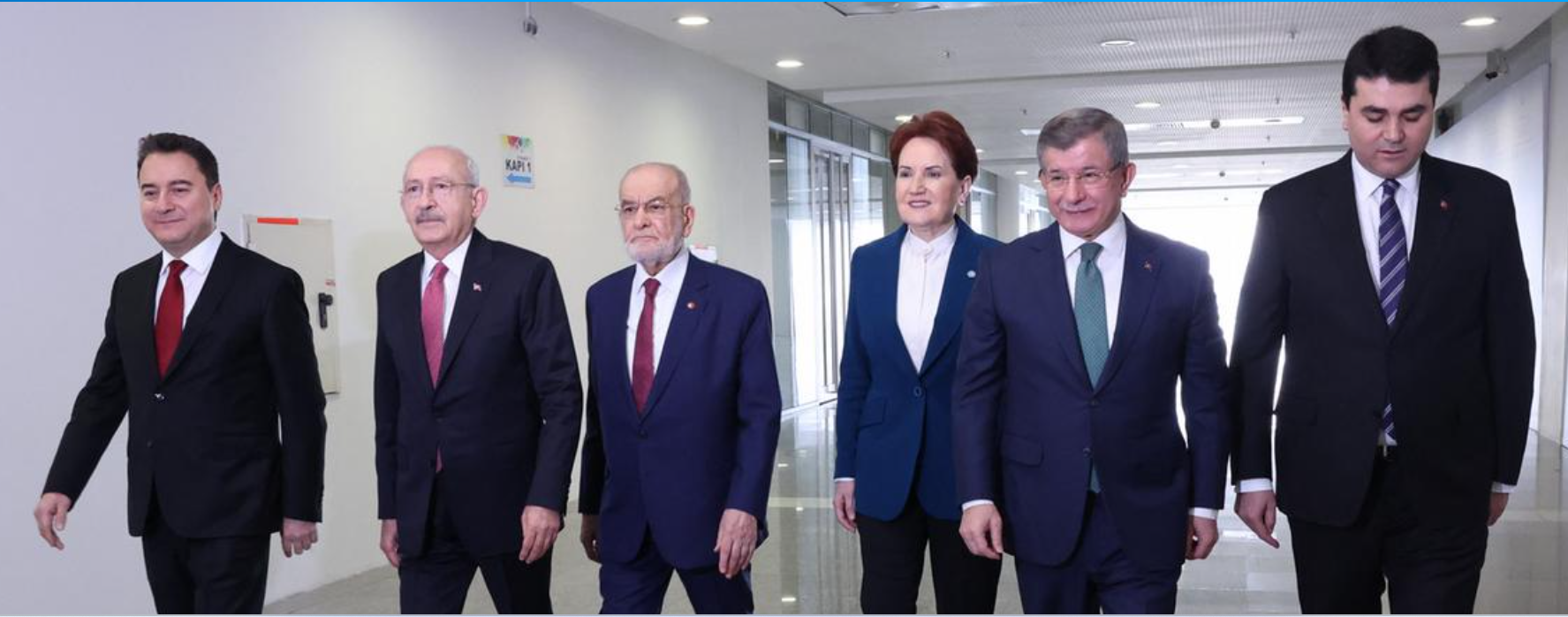A six-party coalition in Turkey aim to go against the block lead by President Recep Tayyip Erdogan and undo his two-decade legacy, including reducing the president’s powers, reports Deutsche Welle. Turkey’s 6 party opposition bloc unveiled a 245 page path to democracy plan yesterday, the detail of which PA Turkey shall cover in the coming days. If the parties can agree on a single presidential candidate in the next two weeks, the document can be turned into a forceful proband tool, reverberating across Anatolia, advocated by 6 parties commanding 45-50% of the national vote and potentially unseat Erdogan.
We shall share a few more international commentary like the one by DW, before reflecting to our readership the view from Turkey and finally analysis by our columnists.
This is how DW viewed the historic coalition protocol:
A coalition of six Turkish opposition parties hoping to unseat President Recep Tayyip Erdogan said they plan to restore Turkey’s parliamentary democracy if their alliance wins upcoming national elections.
It’s part of a lengthy plan for the country’s post-election future announced by the six-party coalition on Monday.
“We will shift to a Strengthened Parliamentary System for a strong, liberal, democratic and just system in which the separation of powers is established,” Faik Oztrak, a deputy head of the main opposition Republican People’s Party, or CHP, said.
He added that the plan foresees a greater separation of powers, including an increased role for parliament and an independent judiciary.
The parties also pledged to unite behind a single joint candidate to challenge Erdogan in the presidential and parliamentary elections, which are expected to take place on May 14. This candidate has not been named.
Opposition says Erdogan rules alone
Erdogan has dominated Turkey’s politics for two decades, introducing a presidential system in 2018 that abolished the prime minister’s office and concentrated most powers in the hands of the president.
The opposition has blamed Turkey’s woes, including an economic downturn and an erosion of rights and freedoms, on Erdogan’s system, which they say amounts to a “one-man rule.”
It said the country was “experiencing one of the most serious administrative and economic crises in the history of the republic.”
In addition to CHP, the opposition alliance, known as the “Nation Alliance” or the “Table of Six” includes, the Good Party; Felicity Party; Democrat Party; The Democracy and Progress Party and Future Party.
Their 2,300-point program aims to roll back many of the powers Erdogan has wrested from parliament and ministries.
Erdogan unleashed sweeping purges after a failed 2016 coup attempt that curbed many of the freedoms.
Opposition politicians and outside critics, including the European Commission, have said that many parts of Turkey’s judiciary are also now under government control.
Turkey passes controversial media law
Analysts estimate an overwhelming percentage of Turkey’s media is now under the control of the government or its business allies.
Hope for strong ties with US, equal footing with Russia
Excluded from the alliance is the pro-Kurdish Peoples’ Democratic Party (HDP), which is the second-largest opposition party.
Early in January, the Constitutional Court blocked the party’s share of treasury money and it is also facing closure over alleged ties with the outlawed Kurdistan Workers Party (PKK). The HDP denies ties to the PKK.
The extradition of alleged PKK militants as well as some followers of Fethullah Gulen, the Muslim cleric accused of the 2016 attempted coup is part of a disagreement Erdogan has with Sweden and Finland over their plans to join the NATO military alliance.
Although this issue is not mentioned in the opposition’s plan, it has stressed the importance of restoring “mutual trust” with the United States. At the same time, the opposition coalition noted that Turkey would “maintain relations with the Russian Federation with an understanding that both parties are equal and strengthened by balanced and constructive dialogue at the institutional level.” The opposition also said that Ankara should continue its efforts to gain “full membership in the European Union.”
Follow our English language YouTube videos @ REAL TURKEY: https://www.youtube.com/channel/UCKpFJB4GFiNkhmpVZQ_d9Rg
And content at Twitter: @AtillaEng
Facebook: Real Turkey Channel: https://www.facebook.com/realturkeychannel/
